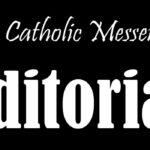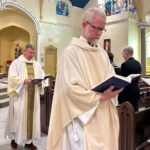By Barb Arland-Fye
The Catholic Messenger
Bishop Thomas Zinkula believes that he and his fellow bishops filled in a missing piece of the puzzle with their approval of a plan to hold them more accountable in relation to reports of clergy sexual abuse.
Their plan implements a legislative document Pope Francis issued in May that created consistent and universal law to safeguard people from clergy sexual abuse and that holds church leaders accountable.
The U.S. Conference of Catholic Bishops (USCCB) approved three documents that address the reporting and investigating of abuse claims and the intentional mishandling of these cases by bishops during their June 11-13 meeting in Baltimore. The USCCB also agreed to establish a national, third-party reporting system to simplify reporting of complaints against bishops.
Approval of the documents “takes the pope’s lead,” Bishop Zinkula said. “It’s all about accountability, transparency and lay involvement.” He said much of the discussion in the bishops’ meeting focused on the role of the laity in holding bishops accountable for their own actions and those of the clergy they lead.
The bishops planned to address accountability measures last fall but the Vatican instructed them to postpone decision-making. They were to await the outcome of a Summit on the Protection of Minors in the Church that Pope Francis convened in February with presidents of Episcopal Conferences from around the world.
In May, the Holy Father issued a “motu proprio,” a legislative text that adds to or modifies canon law. Approved for three years, the new, universal church law provides a mandatory process for church investigations of complaints against bishops (not just priests and deacons) for sex abuse of a minor. It also addresses complaints against bishops for sexual acts involving vulnerable adults and for mishandling or intentionally mishandling abuse or harassment cases, according to the USCCB memorandum.
“It was beneficial that we waited until now,” Bishop Zinkula said. “We have better documents and we are in line with the Holy See on what the Holy Father wants for the universal church.”
The motu proprio does not replace the Charter for the Protection of Children and Young People, a zero-tolerance policy the USCCB enacted in 2002 that required priests and deacons who committed child sexual abuse to be removed from ministry. Nor does the motu proprio replace the Essential Norms that make the policies church law in the U.S.
The USCCB memorandum states that the pope’s motu proprio strengthens protections already in place in the U.S. by:
*Expanding the definition of vulnerable adults to include seminarians and any person made to engage in sexual acts due to a power differential/abuse of power.
*Augmenting fraternal correction in the establishment of a process for investigating various forms of misconduct by bishops.
*Requiring internal, up-the-line reporting and establishing whistleblower protections for anyone reporting a claim of abuse or intentional mishandling of cases.
Reporting and investigation of complaints against bishops will go through a Metropolitan archbishop, who leads the archdiocese that is the chief diocese of an ecclesiastical province. In Iowa, Archbishop Michael Jackels, who leads the Archdiocese of Dubuque, is the Metropolitan archbishop. If a complaint were made against the Metropolitan, a senior bishop in the province would handle the complaint.
The motu proprio law does not require calling the police because in some countries that is not a safe thing to do, the memorandum states. However, existing church law in the U.S. requires notifying public authorities. The Diocese of Davenport, for example, has an agreement with the Scott County Attorney’s Office to report all allegations of clergy sexual abuse to the county attorney. “If we think a criminal act has been committed, we will report it to the civil authorities,” Bishop Zinkula said.
Some Catholics are concerned that the use of lay experts in investigations is permitted but not mandated. , Bishop Zinkula said he and his fellow bishops understand the importance of lay involvement and also believed they should not go beyond the motu proprio’s dictates. “I think all of us know we are going to make use of the laity in significant ways.”
Other highlights from the USCCB meeting
Out of Africa
Cardinal Joseph Tobin, CSsR, asked Bishop Zinkula to serve on the U.S. Conference of Catholic Bishops’ (USCCB) Subcommittee on the Church in Africa. The bishop attended a June 10 meeting, the night before the start of the bishops’ spring meeting. He said he feels honored to serve on the subcommittee because of his interest in reaching out to people on the peripheries, at home and abroad.
His trip to India and advocacy for funding from the federal government to ensure the wellbeing of children and mothers in impoverished nations overseas have been well-publicized.
Among the topics discussed at the subcommittee meeting were national collections, grant requests from 18 different episcopal conferences in Africa and visits to and from Africa, he said.
Bishop Barron’s talk
Bishop Zinkula especially appreciated a talk that Auxiliary Bishop Robert Barron of the Los Angeles Archdiocese gave to his fellow bishops on getting the religiously unaffiliated, the “nones, back to the Catholic Church.”
Bishop Barron, who chairs the USCCB’s Committee on Evangelization and Catechesis, cited sobering statistics about the exodus of millennial Catholics from the church, but also spoke of signs of hope, such as Catholic campus ministry groups. The bishops were enthusiastic about Bishop Barron’s talk. He will speak at their fall meeting on evangelization, Bishop Zinkula said.
The elevator talk
Stepping into the elevator during the bishops’ meeting in Baltimore, Bishop Zinkula exchanged greetings with Anita Raines, who chairs the National Advisory Committee that advises the bishops. Bishop Zinkula introduced himself and mentioned that the chair of the Diocese of Davenport Review Board, Chris McCormick Pries, serves on the National Advisory Committee.
The bishop said Raines smiled in recognition of McCormick Pries and said she’s been a great addition to the advisory committee. Bishop Zinkula nominated McCormick Pries, a member of St. John Vianney Parish in Bettendorf, for an opening on the committee last year. He said her expertise in mental health, serving on the Review Board and in her parish would be assets to the National Advisory Committee.











